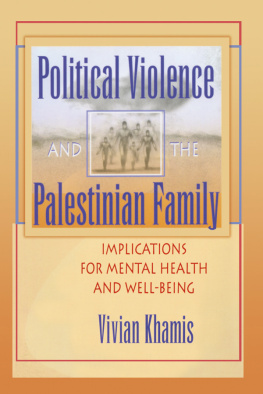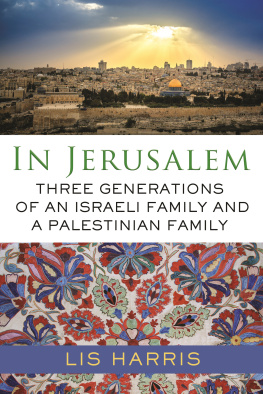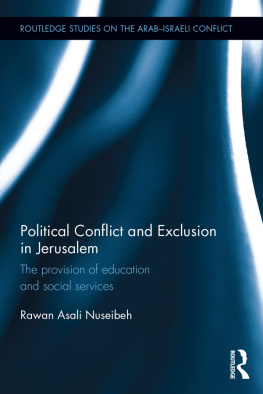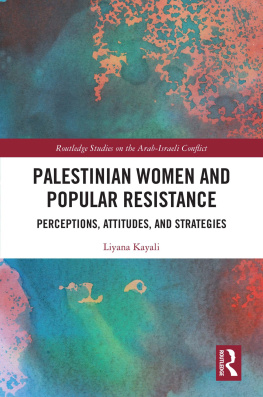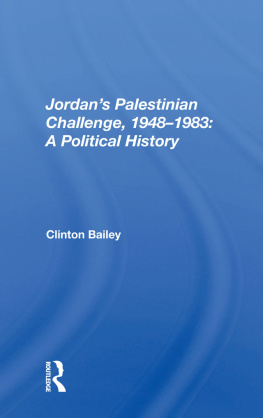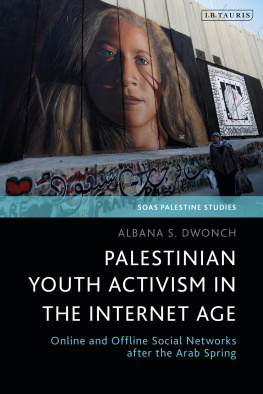First published 2000 by
The Haworth Prees, Inc., 10 Alice Street, Binghamton, NY 13904-1580
This edition published 2013 by Routledge
52 Vanderbilt Avenue, New York, NY 10017
2 Park Square, Milton Park, Abingdon, Oxon 0X14 4RN
Routledge is an imprint of the Taylor and Francis Group, an informa business
2000 by The Haworth Press, Inc. All rights reserved. No part of this work may be reproduced or utilized in any form or by any means, electronic or m echanical, including photocopying, microfilm , and recording, or by any inform ation storage and retrieval system, without permission in writing from the publisher.
Cover design by Jennifer M. Gaska.
Library of Congress Cataloging-in-Publication Data
Khamis, Vivian.
Political violence and the Palestinian family : implications for mental health and well-being/Vivian Khamis.
p. cm.
Includes bibliographical references and index.
ISBN 0-7890-0898-X (alk. paper) ISBN 0-7890-1112-3 (pbk.: alk. paper)
1. Political violenceWest BankPsychological aspects. 2. Political violenceGaza StripPsychological aspects. 3. FamilyMental healthWest Bank. 4. FamilyMental healthGaza Strip. 5. Intifada, 1987Psychological aspects. 6. War victimsMental healthWest Bank. 7. War victimsMental healthGaza Strip. 8. Palestinian ArabsMental health. I. Title.
RC569.5.V55 K43 2000
616.8582dc21 99-462145
It is a pleasure for me to write a foreword for Vivian Khamiss book; years ago, she was a student of mine in psychology, and, since then, I have closely followed her research work.
This welcome book is important on many levels: not only does it offer timely and provocative research on political violence and its effect on mental health among Palestinian families, but it also focuses on a sensitive and central area that has long been neglected in psychological literature.
Research from the Arab world is generally scarce in psychological literature; this dearth of research is, however, particularly marked in the field of political violence and its psychological sequelae in an area that has experienced extreme trauma. For many years, Palestinian families have been continuously subjected to various forms of overwhelming oppression, insecurity, and fear; they have been expelled from their homeland, their homes demolished, land expropriated, as well as being harassed, imprisoned, and deported.
To study the effects of trauma-related experiences and their implication for mental health among affected Palestinian families, it is important to note that the discourse on post-traumatic stress disorder (PTSD) is relatively new. The concept emerged in 1980 with the adoption of the DSM-III and the diagnostic category of PTSD, which presented the formulation of posttraumatic reactions in terms of intrusive, constrictive, and hyperarousal symptoms. Most of the data have been generated by studies of Vietnam veterans, and extrapolation to other traumatized populations has not yet been adequately explored. However, the discourse on trauma dates back to the late nineteenth century when the word trauma was extended to include both bodily damage and the psychological manifestation of distressing experiences.
When discussing the field of PTSD among Palestinian families, the centrality of links between the sociopolitical, economic, and psychological fields must be emphasized. One cannot have a discourse on PTSD, trauma, psychiatric symptoms, mental health, and well-being without highlighting the important contextual factors that shape peoples experience of, and response to, trauma.
Khamis undertook major sociopsychological research of 900 families affected by the spontaneous popular uprising in the West Bank and Gaza Strip, which started in December 1987 (the intifada). This was a significant period in Palestinian social memory for its quality of resistance and meaning that evoked national pride and commitment. It was, however, accompanied by prolonged exposure to an array of relentless punitive measures and pervasive traumatic experiences, ranging from loss of life to physical injury, disfigurement, imprisonment, torture, and loss of property.
The families that sustained the intifada-related traumas were selected from the Palestinian Human Rights Information Centre 1993 census. These families were divided into four groups: families (1) with one family member who had been killed, (2) with one family member who had been injured, (3) with one family member who had been imprisoned, or (4) whose houses had been demolished. Furthermore, participants, both men and women, represented different age groups, residential areas (urban, rural, or camps), as well as different geographical regions (Gaza Strip, West Bank, and East Jerusalem). Khamiss research methodology combined both the empirically controlled quantitative method and the richness of the qualitative method that draws on human experiences, meanings, and beliefs. She used a battery of scales and questionnaires, conducted in participants homes, to assess family members PTSD, psychiatric disorders, stress-related traumas, network and social support resources, coping strategies, ideological commitment (both political and religious), sociopolitical satisfaction, and well-being.
Discussion by focus groups with moderators formed the basis of her qualitative research. This allowed for understanding of affected families personal experiences, patterns of behavior, and belief systems. Moderators focused on specific aspects of their traumatic experiences and the variables they associated with their distress and recovery. Participants were randomly selected from the existing database of two agencies, the YMCA and the Ex-detainees Rehabilitation Program. The participants differed in (1) the degree and type of traumas experienced, (2) geographical region, (3) religion, (4) age, (5) sex, (6) education, and (7) employment status. Sixty-four family members were then divided into groups of eight that were homogenous for sex, age, and education.
These two methodological approaches provided a wealth of material concerning the multifaceted nature of political trauma, the ongoing disruptive stressors associated with traumatic events, the closely knit networks that offer differing kinds of support, as well as the belief systems and meanings that sustain the Palestinians national struggle and strengthen their resilience. The particular features of the Palestinian Arab/Muslim cultural setting provided refuge from the traumatizing coercive policies of Israel.
Khamiss results bring together a rich body of interconnected variables that highlight not only the magnitude and multiplicity of trauma but also the geographic location and certain demographic variables, such as socioeconomic and employment status, as well as gender. Exposure to intense and prolonged trauma was found to have an adverse psychological outcome for a large number of families. The incidence of PTSD was high, and the rate varied with the type and magnitude of the experienced traumatic event. Having a family member killed seems to be a high predictor for the development of PTSD, followed by a family member who had sustained injury or loss of limb, while families with a family member imprisoned seemed to fare better.

